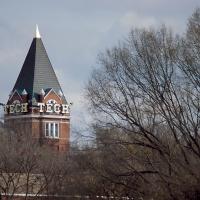Development of a dynamic model for microbial populations in healthy lakes could help scientists understand what’s wrong with sick lakes, prescribe cures and predict what may happen as environmental conditions change…
In humans, cholera is among the world’s most deadly diseases, killing as many as 140,000 persons a year, according to World Health Organization statistics. But in aquatic environments far away from humans, the same…
The National Science Foundation (NSF) has selected Georgia Tech’s Institute for Electronics and Nanotechnology (IEN) to be the Coordinating Office of the…
Sustainability is a nearly ubiquitous concept today, but few would be able to agree on a definition, let alone imagine what it would look like for humans to live sustainably on the Earth. Georgia Tech Professor…
The human microbiome, a diverse collection of microorganisms living inside us and on our skin, has attracted considerable attention for its role in a broad range of human health issues. Now, researchers are…
Populist presidential candidate William Jennings Bryan electrified the 1896 Democratic National Convention with a speech in which he called for a new currency standard based on silver rather than gold. Over the next…
Xiaoyang Meng, a PhD candidate in the School of Civil and Environmental Engineering and a student member of the BBISS research team, has been selected to participate in the final poster competition for the…
The unique properties of metamaterials have been used to cloak objects from light, and to hide them from vibration, pressure waves and heat. Now, a Georgia Institute of Technology researcher wants to add another use…
Researchers have built and demonstrated a novel configurable computing device that uses a thousand times less electrical power – and can be built up to a hundred times smaller – than comparable digital floating-gate…
In emergencies, people may trust robots too much for their own safety, a new study suggests. In a mock building fire, test subjects followed instructions from an “Emergency Guide Robot” even after the machine had…
Human voices are individually recognizable because they’re generated by the unique components of each person’s voice box, pharynx, esophagus and other physical structures.
Researchers are using the same…
Earlier this month, eight students and one faculty member from Tsinghua University’s School of Environment visited Georgia Tech for two weeks…
The Ray C. Anderson Foundation recently awarded a grant to Georgia Tech for a project called VIRTUES (Vertical Integration of Research, and…
BBISS Deputy Director, Michael Chang, is a founding editor-in-chief for the new online academic journal Elementa: Science of the Anthropocene.…
College and university engineering educators from around the country convened at Georgia Tech to learn how to integrate sustainability into their engineering curriculum and pedagogy. About 35 participants from a wide…
A multidisciplinary research team from Georgia Tech has been awarded $549,924 (including an extension) over four years to study ways in which steel production in China can be made more sustainable. The grant is…
On March 10th, 2014, The Brook Byers Institute for Sustainable Systems hosted an event at the Historic Academy of Medicine to honor three Georgia Tech professors as the inaugural recipients of the title…
When acidic materials are spilled, the clean-up procedure involves adding a base chemical to neutralize the acid. Up to a point, the more base added, the more neutral and less toxic the spill becomes.
Something…
Georgia Tech has a strong tradition of student led clubs and organizations. Sustainability related groups have proven to be no exception in this regard. The list below is a comprehensive picture of the broad range of…
The anthroposphere (the place where humans live and where human needs are provided for) needs to be recreated to exist within the means of nature. Two important implications can be drawn from this statement: (1) we…
























